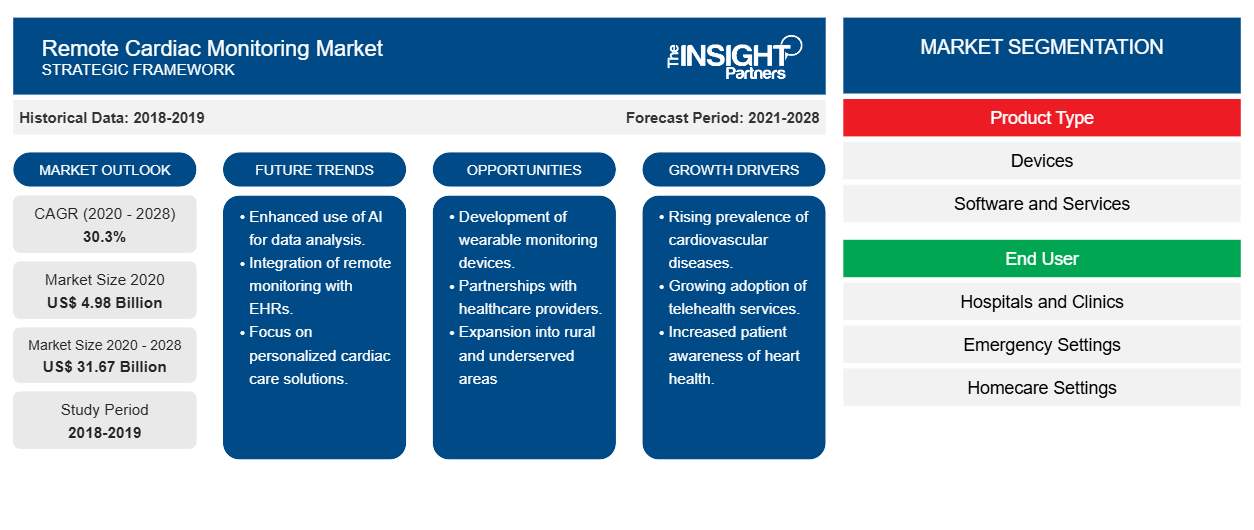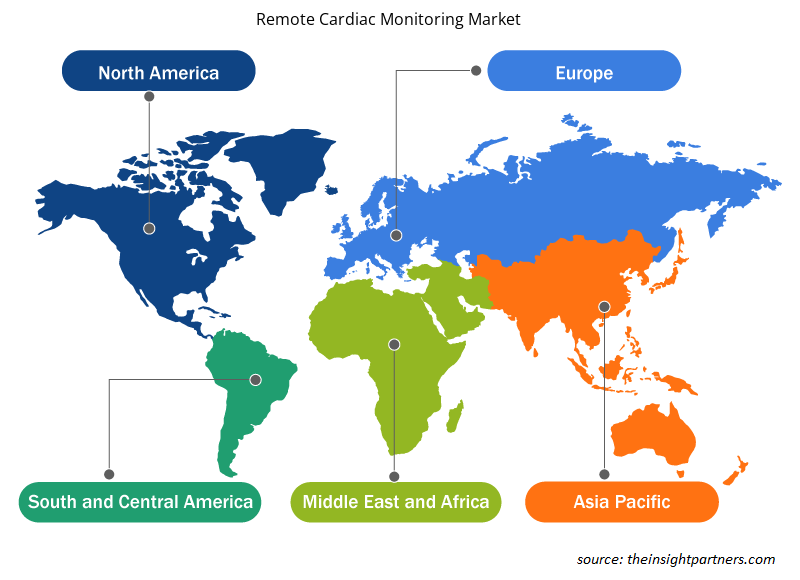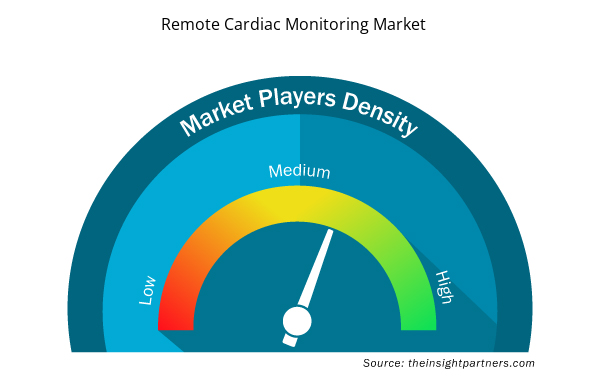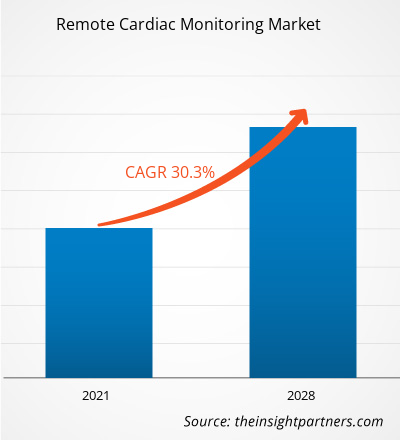The remote cardiac monitoring market is projected to reach US$ 31,671.69 million by 2028 from US$ 4,976.40 million in 2021; it is estimated to grow at a CAGR of 30.3% from 2021 to 2028.
Remote cardiac monitoring devices enable a continuous monitoring of electrical activities of heart away from hospitals. They also allow the at-home electrocardiographic (ECG) monitoring of patients with suspected cardiac arrhythmias or at risk for developing arrhythmias. The monitoring can also be performed when patients are engulfed in their day-to-day activities. Thus, one of the most important benefits of remote cardiac device monitoring is it decreases the need for routine doctor visits. Devices such as pacemakers and implantable cardioverter-defibrillator are implanted in the heart of the patients through minimally invasive procedures. A transmitter that works in sync with the device undertakes the transmission of data. Factors such as increase in the incidence of cardiovascular diseases (CVDs) and continuous developments in the telemedicine approach boost the growth of the remote cardiac monitoring market. However, the concerns regarding data privacy hamper the market growth.
Customize This Report To Suit Your Requirement
You will get customization on any report - free of charge - including parts of this report, or country-level analysis, Excel Data pack, as well as avail great offers and discounts for start-ups & universities
Remote Cardiac Monitoring Market: Strategic Insights

- Get Top Key Market Trends of this report.This FREE sample will include data analysis, ranging from market trends to estimates and forecasts.
Customize This Report To Suit Your Requirement
You will get customization on any report - free of charge - including parts of this report, or country-level analysis, Excel Data pack, as well as avail great offers and discounts for start-ups & universities
Remote Cardiac Monitoring Market: Strategic Insights

- Get Top Key Market Trends of this report.This FREE sample will include data analysis, ranging from market trends to estimates and forecasts.
Market Insights
Increase in Incidence of Cardiovascular Diseases
Remote patient monitoring (RPM) allows patients to manage their health better by increasing their involvement in their health care. The American Heart Association supports initiatives to incentivize the design and use of evidence-based remote patient monitoring technologies. According to the World Health Organization (WHO), cardiovascular diseases (CVDs) are among the leading causes of death worldwide, and ~30 million people experience a stroke each year. According to the American Heart Association, almost half of all adults in the US have a type of CVD. Furthermore, more than 130 million people, i.e., 45.1% of the US population, are projected to have a type of CVD by 2035. According to reports by the European Society of Cardiology, CVDs cause 3.9 million deaths in Europe and over 1.8 million deaths in the European Union (EU). Moreover, they account for 45% of all deaths in Europe and 37% of total deaths in the EU. Mortalities caused by CVDs in the Asia-Pacific countries range from less than 20% in countries such as Thailand, the Philippines, and Indonesia to 20–30% in urban China, Hong Kong, Japan, Korea, and Malaysia. Furthermore, New Zealand, Australia, and Singapore, among others, have relatively high rates of 30–35%.
Hypertension is a significant risk factor for CVDs. The age-adjusted prevalence of hypertension among adults in the US is ~35%, equaling the population of ~85 million. By 2035, ~42% of adults from the country, i.e., an additional 27 million, would have this condition. The cost burden of hypertension on economies is also rising, and the costs are likely to soar from ~US$ 70 billion in 2015 to ~US$ 150 billion by 2035. Remote patient monitoring may serve as a vital conduit for improving hypertension control and reducing the economic burden stemming from prolonged or frequent hospital stays that result from acute hypertension-related events. Research has shown that (Remote Patient Monitoring) RPM can significantly lower systolic blood pressure (SBP) and diastolic blood pressure (DBP) compared to usual care and self-monitoring alone. According to a few non-randomized trials, RPM devices can improve outcomes by enabling accurate and early detection as well as decreasing all-cause mortality rates and hospitalizations. Recent clinical guidelines strongly recommend the use of RPM for atrial fibrillation (AF) detection in both stroke and non-stroke patients.
Product Type-Based Insights
Based on product type, the remote cardiac monitoring market is further segmented into devices, software and services. The devices segment held a larger market share in 2021 and is expected to register a higher CAGR during the forecast period.
End User-Based Insights
Based on end user, the remote cardiac monitoring market is segmented into hospitals and clinics, emergency settings, homecare settings, and others. The hospitals and clinics segment would hold the largest market share in 2021, whereas the market for the emergency settings segment is expected to grow at a CAGR of 31.60% during the forecast period.
Various companies operating in the remote cardiac monitoring market are adopting strategies such as product launches, mergers and acquisitions, collaborations, product innovations, and product portfolio expansions to expand their footprint worldwide, maintain brand name, and meet the growing demand from end users.
Remote Cardiac Monitoring Market Regional Insights
The regional trends and factors influencing the Remote Cardiac Monitoring Market throughout the forecast period have been thoroughly explained by the analysts at Insight Partners. This section also discusses Remote Cardiac Monitoring Market segments and geography across North America, Europe, Asia Pacific, Middle East and Africa, and South and Central America.

- Get the Regional Specific Data for Remote Cardiac Monitoring Market
Remote Cardiac Monitoring Market Report Scope
| Report Attribute | Details |
|---|---|
| Market size in 2020 | US$ 4.98 Billion |
| Market Size by 2028 | US$ 31.67 Billion |
| Global CAGR (2020 - 2028) | 30.3% |
| Historical Data | 2018-2019 |
| Forecast period | 2021-2028 |
| Segments Covered |
By Product Type
|
| Regions and Countries Covered | North America
|
| Market leaders and key company profiles |
Remote Cardiac Monitoring Market Players Density: Understanding Its Impact on Business Dynamics
The Remote Cardiac Monitoring Market market is growing rapidly, driven by increasing end-user demand due to factors such as evolving consumer preferences, technological advancements, and greater awareness of the product's benefits. As demand rises, businesses are expanding their offerings, innovating to meet consumer needs, and capitalizing on emerging trends, which further fuels market growth.
Market players density refers to the distribution of firms or companies operating within a particular market or industry. It indicates how many competitors (market players) are present in a given market space relative to its size or total market value.
Major Companies operating in the Remote Cardiac Monitoring Market are:
- OSI Systems, Inc.
- GE Healthcare
- Biotronik Se
- Nihon Kohden Corporation
- Abbott Laboratories
Disclaimer: The companies listed above are not ranked in any particular order.

- Get the Remote Cardiac Monitoring Market top key players overview
Remote Cardiac Monitoring Market – by Product Type
- Devices
- Software
- Services
Remote Cardiac Monitoring Market – by End User
- Hospitals and Clinics
- Emergency Settings
- Homecare Settings
- Others
Remote Cardiac Monitoring Market – by Geography
- North America
- US
- Canada
- Mexico
- Europe
- France
- Germany
- Italy
- UK
- Spain
- Rest of Europe
- Asia Pacific (APAC)
- China
- India
- South Korea
- Japan
- Australia
- Rest of Asia Pacific
- Middle East & Africa (MEA)
- South Africa
- Saudi Arabia
- UAE
- Rest of Middle East & Africa
- South & Central America (SCAM)
- Brazil
- Argentina
- Rest of South and Central America
Company Profiles
- OSI Systems, Inc.
- GE Healthcare
- Biotronik Se
- Nihon Kohden Corporation
- Abbott Laboratories
- Boston Scientific Corporation
- Koninklijke Philips N.V.
- Honeywell International, Inc.
- AMC Health
- Historical Analysis (2 Years), Base Year, Forecast (7 Years) with CAGR
- PEST and SWOT Analysis
- Market Size Value / Volume - Global, Regional, Country
- Industry and Competitive Landscape
- Excel Dataset



Report Coverage
Revenue forecast, Company Analysis, Industry landscape, Growth factors, and Trends

Segment Covered
Product Type, End User, and Geography

Regional Scope
North America, Europe, Asia Pacific, Middle East & Africa, South & Central America

Country Scope
Argentina, Australia, Brazil, Canada, China, France, Germany, India, Italy, Japan, Mexico, RoAPAC, RoE, RoMEA, RoSCAM, Saudi Arabia, South Africa, South Korea, Spain, United Arab Emirates, United Kingdom, United States
Frequently Asked Questions
Global remote cardiac monitoring market is segmented by region into North America, Europe, Asia Pacific, Middle East & Africa and South & Central America. In North America, the U.S. is the largest market for remote cardiac monitoring. The US is estimated to hold the largest share in the remote cardiac monitoring market during the forecast period. The growth of the market can be because of the rising investments in cardiology informatics, connected devices, and mobile solutions for advanced cardiac care, increasing product launches, and R&D activities to develop advanced remote cardiac monitoring devices. In addition, technologically advanced products are likely to stimulate the growth of remote cardiac monitoring market in North America. On the other hand, growing emphasis on cost optimization, focus on streamlining of clinical processes, increasing number of clinical trials, rise in the government initiatives, growing number of research and development activities, and rising number of product launches and approvals in the Asia Pacific is expected to account for the fastest growth of the region during the coming years.
The remote cardiac monitoring market majorly consists of the players such OSI Systems, Inc., GE Healthcare, Biotronik Se, Nihon Kohden Corporation, Abbott Laboratories, Boston Scientific Corporation, Koninklijke Philips N.V., Honeywell International, Inc. and AMC Health among others.
The hospitals and clinics segment dominated the global remote cardiac monitoring market and accounted for the largest revenue share of 37.60% in 2021.
The device segment dominated the global remote cardiac monitoring market and held the largest revenue share of 58.53% in 2021.
Remote cardiac monitoring is the constant monitoring of electrical activities of the heart, which practices place outside hospitals. The monitoring can also be performed while the patient is doing the day-to-day activities. Devices like pacemakers and implantable cardioverter-defibrillator are placed with the patient through minimally invasive procedures. The transmission of data takes place within a transmitter that works in sync with the device. Remote cardiac monitoring technologies allow home electrocardiographic (ECG) monitoring of patients with suspected cardiac arrhythmias or at risk for developing arrhythmias. One of the most important benefits of remote cardiac device monitoring is that it cuts down on routine doctor visits. Without remote monitoring, patients visited the doctor every three to six months (depending on device type) for a data download. With remote monitoring, the number of visits have dropped to one to two per year. Remote cardiac device monitoring is a fantastic way to follow patients and it has always been important, but it’s especially important in this era of COVID-19.
Key factors that are driving the growth of this market are increase in incidence of cardiovascular diseases, continuous developments in telemedicine approach, and rising investment in research and development are expected to boost the market growth for the remote cardiac monitoring over the years.
Trends and growth analysis reports related to Life Sciences : READ MORE..
The List of Companies - Remote Cardiac Monitoring Market
- OSI Systems, Inc.
- GE Healthcare
- Biotronik Se
- Nihon Kohden Corporation
- Abbott Laboratories
- Boston Scientific Corporation
- Koninklijke Philips N.V.
- Honeywell International, Inc.
- AMC Health

 Get Free Sample For
Get Free Sample For